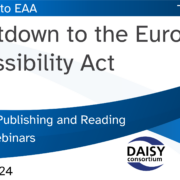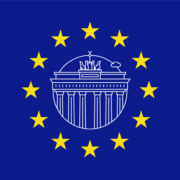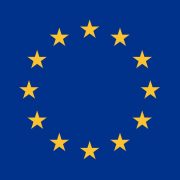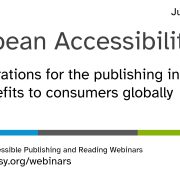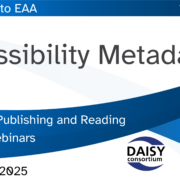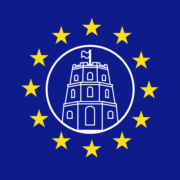EU Accessibility Act: Update (W)
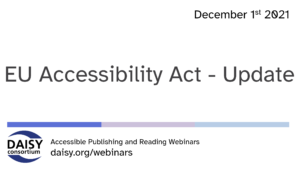 In our series of free weekly webinars December 1st saw a session focused on the European Accessibility Act giving us a chance to check-in and find out the latest updates as we prepare for the act.
In our series of free weekly webinars December 1st saw a session focused on the European Accessibility Act giving us a chance to check-in and find out the latest updates as we prepare for the act.
This page contains:
Full Video of the Webinar
Speakers
- Richard Orme, DAISY Consortium—host and chair
- Antoine Fobe, European Blind Union
- Cristina Mussinellim, The LIA Foundation
- Thomas Kahlisch, dzb lesen
with contributions from:
- Louis Marle, Albin Michel, France
- Oscar Heslinga, Inginitas Learning, Netherlands
- Jonas Lillqvist, Svenska Litteratursällskapet, Finland
Session Overview
This webinar discussed the implementation progress and latest developments in EAA legislation which is already shaping practices in Europe and around the world. Many organizations that sell into Europe are having to adapt their practices to comply with the new accessibility requirements.
The European Accessibility Act: Why, What and When?
Antoine Forbe began the webinar by giving us an essential refresher to the EAA, reminding us that it is essential for approx 80 million people in Europe who rely on accessible content. It became necessary to develop a single, coherent set of accessibility rules and in 2015 the European Commission proposed a wide-reaching accessibility act. After long periods of negotiation, the EAA was adopted in 2019, creating an obligation for member states to ensure that selected products and services placed in the EU market comply with accessibility requirements. There are many benefits, including:
For Businesses
- A reduction in costs for the production of accessible goods
- Easier cross border trading
- Marketing opportunities for accessible products and services
For Citizens
- More accessible products in the market
- Competitively priced products
- Fewer barriers to access
- More jobs where accessibility expertise is needed
The act is not truly horizontal in that it applies to only a select list of products and services, with specific emphasis on digital. It does, however, bring a comprehensive set of minimum accessibility requirements that all businesses must respect and this is a wonderful step in the right direction. The act will have a wide impact on the publishing industry throughout the supply chain.
Requiring national transposition by June 2022, the EAA is in fact a directive, the entry into force date is 2025.
Update on Technical Developments
Cristina Mussinelli spoke to us about digital publishing standards that are important in meeting the requirements of the EAA directive.
EPUB offers the greatest opportunity for the econtent itself and a new version, EPUB 3.3, is due to be published soon. Accessibility requirements are one of the main areas of focus within the standard and it is accompanied by EPUB Accessibility 1.1, an accessibility specification together with the Digital Publishing WAI-ARIA Module 1.1.
Metadata standards are vital for the end-user in order to inform the reader about accessible content. The following standards need to be adhered to: schema.org within the EPUB package, ONIX to directly inform the retailer and coming soon, a standardized method of describing content accessibility from W3C.
Work and research have been completed to make sure that these standards are robust enough to meet the requirements of the EAA.
For retailers and libraries, the W3C has recently published the User Experience Guide for Displaying Accessibility Metadata 1.0
Work continues in this area to look at other ebook formats, all the various departments in the publishing supply chain and a focus on end user awareness.
DAISY’s EU Inclusive Publishing Initiative
Thomas Kahlisch explained the work of The DAISY Consortium and its efforts to improve collaboration between the organizations involved in the EAA and the publishing industry via a community network.
Areas of focus include: guidance, survey, case studies and signposting of resources. The survey was sent out to all EU countries and we have heard back from 14 (74% of the market). The complete findings will be published in January 2022 but results already show that countries are at very different stages in their preparation for the EAA. Some countries have steering groups which help to connect and collaborate both nationally and internationally.
Case studies from Finland, The Netherlands, Germany and Italy look more closely at some of the preparatory details and materials that are already being used and we look forward to publishing more of these country-specific studies as part of the EU Inclusive Publishing Initiative.
Thomas finished by drawing attention to the variety of resources available on this good work at Inclusive Publishing’s EAA Resource page which includes details of how to collaborate with the EU Inclusive Publishing Initiative.
Publisher Voices
Previous webinars about the EAA have emphasized the importance of starting to prepare now for 2025 and many publishers have begun their journey towards accessible publishing already. We heard from Luis Marle, Albin Michel, France; Oscar Heslinga, Inginitas Learning, Netherlands; Jonas Lillqvist, Svenska Litteratursällskapet, Finland on the progress they have been making, informing us of some of the lessons they learned on the way. Please take the time to listen to their extremely useful advice.
Related Resources
- PowerPoint slide deck (2MB)
- Full transcript Word document (34KB)
Legislation Resources
- EU Directive 2019/882 on the Accessibility Requirements for Products and Services – Legislation that came into force in 2019 defining the various elements of the European Accessibility Act and their implementation schedule. Available in 24 languages.
- Introduction to the European Accessibility Act – Video introduction to the Act from the European Commission, English with captions.
- The European Accessibility Act—Consideration for the Publishing Industry and Benefits to Consumers Globally Previous DAISY webinar recording and write-up focused on the European Accessibility Act and implications for publishing and reading.
- European Disability Forum Video: Advocating for strong national adoption of the European Accessibility Act
- European Disability Forum Toolkit for the Transposition of the EAA
- European Commission Factsheet on the EAA (PDF)
Standards and Technical Developments
- EPUB 3.3 specification
- EPUB Accessibility 1.1
- Digital Publishing WAI-ARIA Module 1.1
- Accessibility Discoverability Vocabulary for Schema.org
- ONIX for Books metadata
- Schema.org Metadata
- European Accessibility Act requirements: are publishing standards as EPUB, ONIX and Schema.org fully compliant? – Fondazione LIA
- EPUB Accessibility – EU Accessibility Act Mapping
- User Experience Guide for Displaying Accessibility Metadata 1.0
Communication Activities
- DAISY European Inclusive Publishing Forum
- Inclusive Publishing EU Resources page
- EAA Adoption Case Studies:


